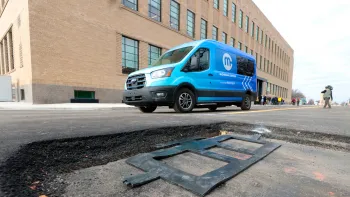
In a groundbreaking move towards a sustainable future, Detroit is set to become the first city in America to implement an electric road charging system (ERS). At the Resilience and Equity in Clean Energy 2023 (RECESS23) Conference, Mayor Duggan announced the ambitious project, emphasizing its uniqueness in comparison to traditional road constructions.
This innovative initiative was made possible by a partnership between the Michigan Department of Transportation and Electreon. The state is investing $1.9 million in this project, signaling a significant commitment to cleaner and more sustainable transportation. The completed ERS will cover a 1-mile stretch on 14th street in Corktown, Detroit, near the historic Michigan Central Station. It will operate by transferring magnetic frequencies to a charging pad beneath a vehicle, allowing cars to charge while in motion.
The move towards electric vehicles (EVs) is not just a technological shift but also a response to growing environmental concerns. Air pollution and toxic emissions, primarily stemming from traditional gasoline-fueled vehicles, have prompted increased awareness among Detroit residents. EVs emerge as a viable solution, presenting an efficient and environmentally friendly alternative to conventional automobiles.
However, despite the interest in EVs, disparities in ownership persist, particularly among Black and Latino communities. While these communities constitute only 2% of electric vehicle owners, a Consumer Reports survey reveals that 38% of Black and 43% of Latino individuals express a definite or serious interest in purchasing an electric vehicle. One significant barrier to EV adoption, highlighted by the Consumer Reports survey, is the accessibility and convenience of charging locations, with at-home charging being the most affordable option. This presents a challenge for communities with lower homeownership rates, where multi-unit dwelling living is more common, as it limits access to affordable charging resources.
The introduction of the ERS in Detroit is poised to address this crucial challenge, specifically benefiting communities that have been historically excluded from the clean energy sector. Detroit, known for its predominately Black population and as the car capital of the world, is not only making history with this initiative but is also recognizing the Black and Latino community as significant participants in the sustainability market.
As Detroit paves the way for the future of transportation, the Electric Road Charging System emerges as a beacon of inclusivity, ensuring that the benefits of clean energy and sustainable living are accessible to all. This electrifying initiative not only redefines Detroit's urban landscape but sparks a positive trajectory for equitable environmental progress, setting an inspiring example for cities nationwide to follow in the pursuit of a greener, more inclusive tomorrow.

